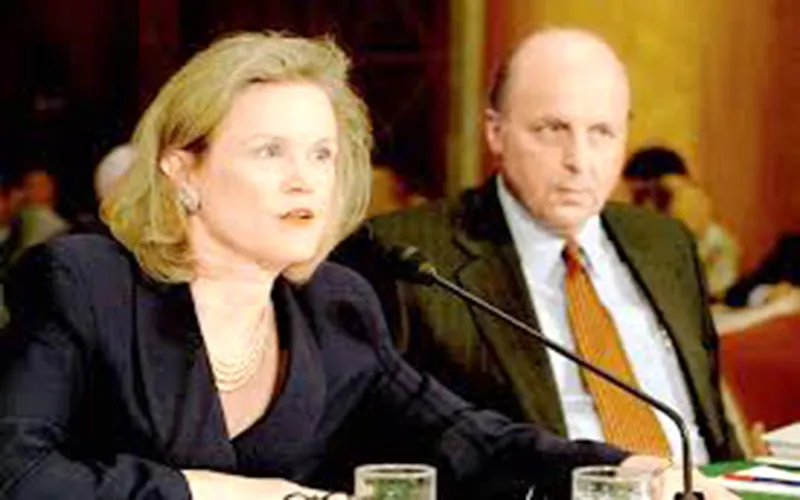-
CENTRES
Progammes & Centres
Location
Throughout the 1990s, the Anglo-US duo remained obsessed with India's nuclear plans and virtually refused any discussions on Pakistani assistance to terrorism in India. The US also did succeed in delaying our missile programme even as they equipped Pakistan with nuclear capable F-16s.

She was called Lady Taliban by some, reflecting her zealotry for supporting wrong causes but she was more like Lady Macbeth reflecting an ambition to succeed till her sudden replacement. Robin Raphel was a middling US State Department official entrusted by an absent-minded Clinton Administration to sort out India and Pakistan on the Kashmir issue and to pressure Indians into signing the Comprehensive Nuclear-Test-Ban Treaty (CTBT). It did gall many Indians to see a smiling Joint Secretary-level US officer meeting our pouting prime minister and others but there were circumstances that possibly forced India. US-India relations had nosedived by 1993.
The early nineties were bad days for India. We were economically broke, the West had won the Cold War, the Soviet Union had collapsed, the senior Bushes were trampling all over Iraq in a display of what End of History could look like for the rest of us and Pakistan had been emboldened by victory of the Afghan jihad. It was now ready for what Pakistan hoped would be the final push against India by deploying its jihadi hordes in the Valley.
A former Counsellor in the Embassy in New Delhi, Assistant Secretary Raphel went around New Delhi clumsily and arrogantly pushing her line. She encouraged the formation of the Hurriyat in India, increased their profile, doubted the J&K Instrument of Accession, offered US mediation and pressured India on human rights violations in J&K even as we battled the most vicious terror attacks by Pakistan-aided, financed and equipped terrorists. By 1991 one heard cocky Pakistani diplomats saying that by the following year Kashmir would be "resolved". The unsuccessful Pakistani campaign to have the UN Human Rights Commission declare India as a violator of human rights in Kashmir in 1994 had been encouraged by Robin Raphel.
But Raphel was not a loose cannon. She was abrasively pushing a certain policy line from Washington DC at that time. It was not enough to pressure India on human rights violations in J&K, but the situation in Punjab was also used for adverse comment. President Clinton in a letter to Gary Condit, Democratic Representative from California, expressed his resolve to work "for a peaceful solution that protects Sikh rights." There were other pressures too.
In 1993, the US succeeded in forcing a weakened Russia to abrogate its agreement to sell cryogenic technology to India on the grounds that it violated the Missile Technology Control regime and ISRO was placed under sanctions. India was also openly advised by the US to give up its medium-range missile, Agni and short-range missile, Prithvi.
The US did succeed in delaying our missile programme even as they equipped Pakistan with nuclear capable F-16s.
Throughout the 1990s, the Anglo-US duo remained obsessed with India's nuclear plans and virtually refused any discussions on Pakistani assistance to terrorism in India. At best, they would listen, polite and bored but the "P" word was taboo. The Americans preferred to protect the Pakistanis and India was left facing countercharges from them about interference in Pakistan. India-US relations began an upturn in Clinton's second term when Karl Inderfurth replaced Raphel.
There were other business interests too. The Taliban's abominable human rights record notwithstanding, Raphel visited Afghanistan in 1996 seeking to support the American company UNOCAL for a contract to build the gas pipeline from Turkmenistan through Afghanistan into Pakistan as this would avoid Iran. The Taliban were the favoured group not only because they were getting to be powerful in Afghanistan but as Sunnis they would be opposed to Iran and the US had been supporting the Taliban since 1994. Eventually, the two fell out once the Taliban decided to support Osama bin Laden and offered no joy to UNOCAL.
The US system of revolving doors allows this but it must be a coincidence that a former Assistant Secretary for South Asia after retiring from the Foreign Service in 2005 was employed on a contract believed to be worth a million dollars by Cassidy & Associates, a firm that has lobbied for the government of Pakistan. Post-retirement, Raphel did a stint with Richard Holbrooke on AfPak and was located in Pakistan.
The details of the charges, if any, against her that led to the FBI raid on her house and office are not yet known. Raphel was a Washington Beltway heavy and just as she had the nod on-high for her pursuit of the Pakistani cause with India, there must have been some nod for this FBI search.
(The writer is a former chief of Research and Analysis Wing and now an Advisor to Observer Research Foundation)
Courtesy : www.mid-day.com
The views expressed above belong to the author(s). ORF research and analyses now available on Telegram! Click here to access our curated content — blogs, longforms and interviews.

Vikram Sood is Advisor at Observer Research Foundation. Mr. Sood is the former head of the Research and Analysis Wing (R&AW) — India’s foreign intelligence agency. ...
Read More +